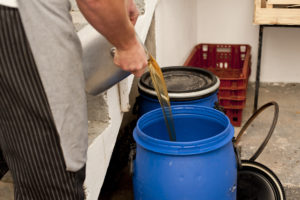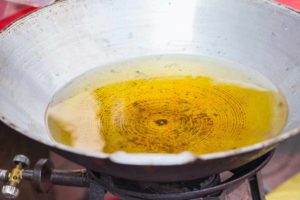We frequently have extra cooking oil after deep-frying, browning ground beef, or cooking bacon. The temptation could be to pour it down the kitchen sink, but doing so might damage the plumbing and harm wildlife if it’s dumped outside on the ground. As a result, you should dispose of cooking oil properly. Throwing it in the garbage, reusing it, or getting in touch with a recycling firm like NJ Oil Recyclers are the three best methods to get rid of used cooking oil.
1. Put Oil in the Trash
The very first and easy option is to put the oil in the trash. But you can’t just throw it away in the trash rather you need to follow a proper procedure. Follow the steps below;
Put Oil Into Containers: Let the oil cool completely before pouring it into a non-recyclable container with a cover and throwing it in the trash if you want to get rid of it. Milk cartons made of cardboard and other similar wax- or plastic-lined paper containers are examples of common non-recyclable containers that function effectively. Other suitable possibilities are Styrofoam and other takeout containers.

Chill Until Solid: If you would rather discard it, you must first freeze or cool the oil to make it solidify. Put the oil in a used can and store it in the refrigerator or freezer. The oil is ready to be disposed of after it is solid enough to remove from the can in one piece.
Throw It In The Trash: Pour any excess grease or oil into a coffee mug and place it in the refrigerator if you only have a cup of it. Scoop it out with a spoon once it solidifies and dispose of it in the trash. Before washing the mug, wipe it down with a paper towel or an old napkin.
You can combine the oil with an absorbent substance, such as cat litter, sand, or sawdust, which readily absorbs the liquid, before discarding it. Save old oil in a used container until it is time to empty the litter box; drop the oil into the litter before dumping it out.
2. Reuse the Oil
There’s no need to squander all that frying oil. If you anticipate doing a lot of frying in the near future, think about utilizing your oil to prepare dishes with a similar flavor. Here are some ideas and methods for recycling and using excess oil.
Strain the Oil: The delectable bits of fried okra that remain in the bottom of the skillet must be strained out if you wish to continue using the frying oil for another purpose. If you don’t get rid of the food fragments, the oil can get moldy or go rancid. Set a coffee filter or wire mesh strainer over a dish and slowly pour the used oil into it after the oil has cooled.
Store It: After removing the last bits of food, store the oil in an airtight container in the fridge or at room temperature. Used oil should only be kept in storage for three to four weeks. If you intend to reuse the cooking oil, keep in mind that it will absorb the potent tastes of whatever you are cooking.
Use It Again: You can use the oil the next time you want to cook something. You can be confident that it will be risk-free to use and that the flavor won’t be impacted either. The main advantage is that you won’t have to dispose of the oil and harm the environment.
3. Recycle the Oil
Think about if you would prefer liquid or solid used cooking oil. Some people prefer to handle solid waste over liquid waste. If so, just allow the oil to cool and it will solidify into a block of frozen grease. Cooking oil should be frozen after cooling down if you want it to be really solid. Cooking oil may be handled more easily when frozen, which is one of the key advantages. That includes whether you intend to recycle it shortly or throw it away.

Keep Filling Up A Container: This is particularly true if you use very little cooking oil. Making the most of the container you’re using and saving time by dumping all of your spent cooking oil at once are both possible by topping it off as necessary. Because it is thought that all of the cooking oils in this situation have already been used to their fullest extent and are ready to be recycled, you don’t need to worry about them being mixed up in your disposal container.
Find A Recycling Center: Used cooking oil is occasionally accepted by recycling facilities as domestic hazardous waste. In certain circumstances, they will only accept cooking oil around the holidays. If so, you can search for different disposal options. Make sure to inquire about any free programs first with your neighborhood department of public works. To find out if such programs are offered, you might simply Google the topic or contact the relevant municipal or state authority.
Ask if spent cooking oil is accepted at your local recycling facility. If so, pour the oil into an empty gallon milk jug and recycle it after it is filled. In some places, you can ask neighborhood restaurants for help getting rid of cooking oil. You can take your cooking oil, after properly storing it in a container, to a restaurant that can handle the disposal or locate a hazardous waste facility that accepts drop-offs.
NJ Oil Recyclers is a company that offers the best oil recycling services. You can simply store the leftover oil after cooking and after some time you can contact us. We will collect the oil and recycle it. You just need to call us and our professional and experienced team in NJ Oil Recyclers will collect the oil and recycle it. Never again pour down the leftover oil in the sink rather use one of the three above-mentioned ways to get rid of used cooking oils.



